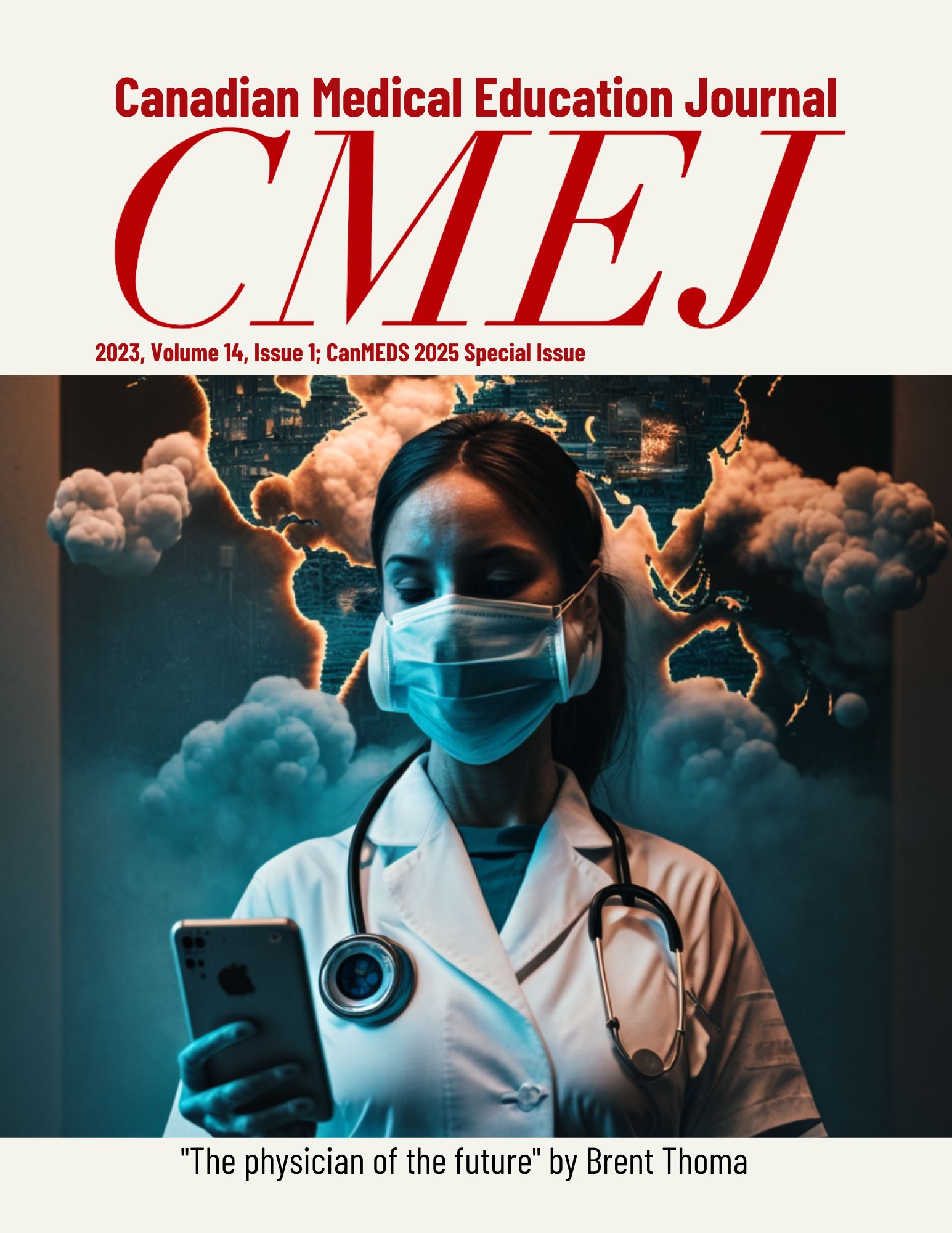Evaluation of a tool to improve the quality of preceptor written feedback for family medicine residents: training and use of a CanMEDS-MF competency-based criterion guide
DOI:
https://doi.org/10.36834/cmej.75256Abstract
Background: Written feedback is essential in resident teaching, but preceptors are not always well equipped to provide relevant feedback. The purpose of this study was to evaluate the effectiveness of multi-episodic training and the use of a criterion-referenced guide for written feedback for family medicine preceptors in a French-language academic hospital.
Method: Twenty-three (23) preceptors participated in the training and used the criterion-referenced guide to guide them during the written evaluation in an evaluation sheet named "Field Notes". The content of these Field Notes was analyzed according to completion, the rate of specific feedback, and the rate of feedback by CanMEDS-MF role before and after the training over a 3-month period.
Results: Based on the analysis of the Field Notes (n=70 pre-test; n=138 post-test), an increase in the percentage of completion (50% vs. 92%, z=2.97, p=0.0030) and specific feedback (59% vs. 92%, z=2.47, p=0.0137) was noted. There was no significant increase in feedback by CanMEDS-MF role.
Conclusions: The development of multi-episodic training and a criterion-referenced guide, created according to the CanMEDS-MF repository, suggests an improvement in comprehensive and specific written feedback in family medicine education.
References
Anderson PAM. Giving feedback on clinical skills: are we starving our young? J Grad Med Educ. 2012;4(2):154-158. https://doi.org/10.4300/jgme-d-11-000295.1
Shaw E, Oandasan I, Fowler N, éds. CanMEDS-Médecine Familiale 2017 : Un référentiel de compétences pour les médecins de famille dans tout le continuum de formation.; 2017.
Lacasse M, Renaud J, Cantat A, Saucier D, Renaud J. Développement de compétences avancées dans la formation des futurs médecins : l’exemple de la médecine familiale au Canada. Éducation Francoph. 2021;44(2):126-151. https://doi.org/10.7202/1039025ar
Hattie J, Timperley H. The power of feedback. Rev Educ Res. 2007;77(1):81-112. https://doi.org/10.3102/003465430298487
Georgoff PE, Shaughness G, Leininger L, et al. Evaluating the performance of the minute feedback system: a web-based feedback tool for medical students. Am J Surg. 2018;215(2):293-297. https://doi.org/10.1016/j.amjsurg.2017.08.047
Cantillon P, Sargeant J. Giving feedback in clinical settings. BMJ. 2008;337(7681):1292-1294. https://doi.org/10.1136/BMJ.A1961
Wilkinson ST, Couldry R, Phillips H, Buck B. Original series preceptor development: providing effective feedback. Hosp Pharm. 2013;48(1):26-32. https://doi.org/10.1310/hpj4801-26
Van De Ridder JMM, Stokking KM, McGaghie WC, Ten Cate OTJ. What is feedback in clinical education? Med Educ. 2008;42(2):189-197. https://doi.org/10.1111/j.1365-2923.2007.02973.x
Nicol D, MacFarlane-Dick D. Formative assessment and selfregulated learning: a model and seven principles of good feedback practice. Stud High Educ. 2006;31(2):199-218. https://doi.org/10.1080/03075070600572090
Glover C, Brown E. Written feedback for students: too much, too detailed or too incomprehensible to be effective? Biosci Educ. 2006;7(1):1-16. https://doi.org/10.3108/beej.2006.07000004
Lizzio A, Wilson K. Feedback on assessment: Students’ perceptions of quality and effectiveness. Assess Eval High Educ. 2008;33(3):263-275. https://doi.org/10.1080/02602930701292548
Toubassi CCFP Amita Singwi CCFP Ian Waters MSW RSW D. Implementation of a patient-based feedback tool to assess the CanMEDS-FM communicator role. Can Fam Physician | Le Médecin Fam Can. 2018;64(10):778-779. www.cfpc.ca/uploadedFiles/ [Accessed Nov 29, 2022].
Ogrinc G, Davies L, Goodman D, Batalden P, Davidoff F, Stevens D. SQUIRE 2.0 (Standards for QUality Improvement Reporting Excellence): revised publication guidelines from a detailed consensus process. BMJ Qual Saf. 2016;25(12):986-992. https://doi.org/10.1136/bmjqs-2015-004411
Ogrinc G, Armstrong GE, Dolansky MA, Singh MK, Davies L. SQUIRE-EDU (Standards for QUality Improvement Reporting Excellence in Education): publication guidelines for educational improvement. Acad Med. 2019;94(10):1461-1470. https://doi.org/10.1097/ACM.0000000000002750
Van De Ridder JMM, Mcgaghie WC, Stokking KM, ten Cate OTJ. Variables that affect the process and outcome of feedback, relevant for medical training: a meta-review. Med Educ. 2015;49(7):658-673. https://doi.org/10.1111/medu.12744
Renting N, Gans ROB, Borleffs JCC, et al. A feedback system in residency to evaluate CanMEDS roles and provide high-quality feedback: exploring its application a feedback system in residency to evaluate CanMEDS roles and provide high-quality feedback: Exploring its application. Med Teach. 2016;38(7):738-745. https://doi.org/10.3109/0142159X.2015.1075649
McConnell M, Gu A, Arshad A, Mokhtari A, Azzam K. An innovative approach to identifying learning needs for intrinsic CanMEDS roles in continuing professional development. 2018;23(1). https://doi.org/10.1080/10872981.2018.1497374
Kazevman G, Ng JCY, Marshall JL, Slater M, Leung FH, Guiang CB. Challenges for family medicine residents in attaining the CanMEDS professional role: a thematic analysis of preceptor field notes. Acad Med. 2021;96(11):1598-1602. https://doi.org/10.1097/ACM.0000000000004184
Downloads
Published
Issue
Section
License
Copyright (c) 2023 Chloé Desjardins, Lyne Pitre, David Adjo, Jean Henri Sagne, Salomon Fotsing, Éric Dionne , Edward Seale, Marjorie Pomerleau, Marissa Philippe, Georges Gharib, Manon Denis-LeBlanc

This work is licensed under a Creative Commons Attribution-NonCommercial-NoDerivatives 4.0 International License.
Submission of an original manuscript to the Canadian Medical Education Journal will be taken to mean that it represents original work not previously published, that it is not being considered elsewhere for publication. If accepted for publication, it will be published online and it will not be published elsewhere in the same form, for commercial purposes, in any language, without the consent of the publisher.
Authors who publish in the Canadian Medical Education Journal agree to release their articles under the Creative Commons Attribution-Noncommercial-No Derivative Works 4.0 Canada Licence. This licence allows anyone to copy and distribute the article for non-commercial purposes provided that appropriate attribution is given. For details of the rights an author grants users of their work, please see the licence summary and the full licence.











